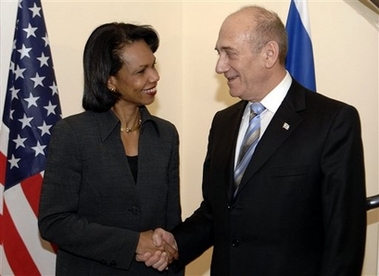Israelis, Palestinians to resume talks
(AP)Updated: 2007-03-27 08:50
JERUSALEM - Under US pressure to answer increasing Arab flexibility on Mideast peace, Israel has agreed to resume face-to-face talks with a moderate, Western-backed Palestinian leader who is sharing power with Islamic Hamas militants, a US official said Monday.
The new developments came at a time of high-profile diplomacy, with Secretary of State Condoleezza Rice and United Nations chief Ban Ki-Moon both in the region for talks with Israeli and Arab leaders.
Rice has been trying to revive peace talks between Israel and the Palestinians, with help from Arab neighbors. The odds were long even before the latest complication posed by Hamas, a political and military organization that Israel, the United States and the European Union count as a terror group.
A senior US official said Israeli Prime Minister Ehud Olmert agreed to sit down with Palestinian President Mahmoud Abbas for the first time since Abbas sealed a desperation pact with the militants.
The two will hold "regular face-to-face discussions," said the official, speaking on condition of anonymity ahead of a planned address by Rice on Tuesday.
The coalition government was formed more than a week ago under terms that fall short of international demands to recognize Israel, renounce violence and accept agreements negotiated by the previous, secular Palestinian leadership.
Abbas has called the deal the best he could get from the politically formidable militants, and a necessary step to end deadly internal Palestinian violence.
Olmert, who had once called Abbas a "partner for peace," said the deal meant he would limit talks with the Palestinian leader to humanitarian or similar immediate concerns. He initially ruled out more detailed discussions or negotiations.
Olmert's reconsideration of that stance was a small step, since Olmert held such sessions with Abbas before the Hamas deal, but a sign of fresh and surprising traction toward peace talks despite the complication posed by Hamas.
The US official said Olmert and Abbas would initially hold low-key "confidence-building" sessions. The talks have "an open door to all issues," the official said, but it was clear that the United States wanted Israel to go farther.
Negotiators haggled behind closed doors for several hours Monday night, apparently stuck over whether Olmert would fully open the door to fresh talks over the hardest issues that divide Israel and the Palestinians, such as the borders of an eventual Palestinian state and the fate of disputed Jerusalem.
It was not clear when the leaders might meet, although Palestinian officials had said US diplomats proposed a date in mid-April.
The US official said Rice will continue to raise all issues in her separate meetings with each leader.
"The prime minister is interested in keeping an open line of dialogue with
the Palestinian Authority chairman on humanitarian and security-related issues
and has met with him twice in the last month," said David Baker, an official in
Olmert's office.
| 1 | 2 |  |
|
||
|
||
|
|

